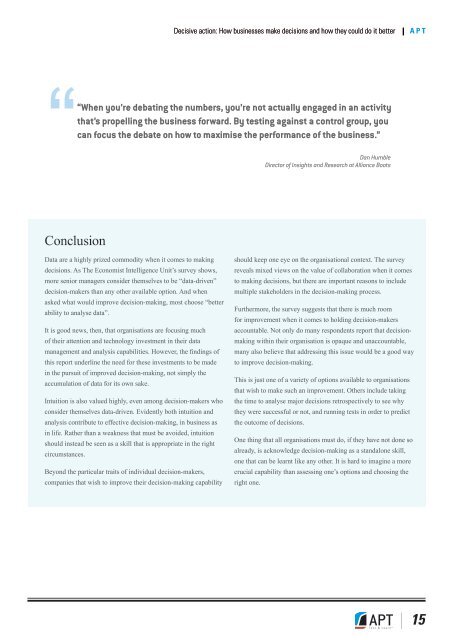Decisive Action - How businesses make decisions
Decisive Action - How businesses make decisions
Decisive Action - How businesses make decisions
Create successful ePaper yourself
Turn your PDF publications into a flip-book with our unique Google optimized e-Paper software.
<strong>Decisive</strong> action: <strong>How</strong> <strong>businesses</strong> <strong>make</strong> <strong>decisions</strong> and how they could do it better| APT““When you’re debating the numbers, you’re not actually engaged in an activitythat’s propelling the business forward. By testing against a control group, youcan focus the debate on how to maximise the performance of the business.”Dan HumbleDirector of Insights and Research at Alliance BootsConclusionData are a highly prized commodity when it comes to making<strong>decisions</strong>. As The Economist Intelligence Unit’s survey shows,more senior managers consider themselves to be “data-driven”decision-<strong>make</strong>rs than any other available option. And whenasked what would improve decision-making, most choose “betterability to analyse data”.It is good news, then, that organisations are focusing muchof their attention and technology investment in their datamanagement and analysis capabilities. <strong>How</strong>ever, the findings ofthis report underline the need for these investments to be madein the pursuit of improved decision-making, not simply theaccumulation of data for its own sake.Intuition is also valued highly, even among decision-<strong>make</strong>rs whoconsider themselves data-driven. Evidently both intuition andanalysis contribute to effective decision-making, in business asin life. Rather than a weakness that must be avoided, intuitionshould instead be seen as a skill that is appropriate in the rightcircumstances.Beyond the particular traits of individual decision-<strong>make</strong>rs,companies that wish to improve their decision-making capabilityshould keep one eye on the organisational context. The surveyreveals mixed views on the value of collaboration when it comesto making <strong>decisions</strong>, but there are important reasons to includemultiple stakeholders in the decision-making process.Furthermore, the survey suggests that there is much roomfor improvement when it comes to holding decision-<strong>make</strong>rsaccountable. Not only do many respondents report that decisionmakingwithin their organisation is opaque and unaccountable,many also believe that addressing this issue would be a good wayto improve decision-making.This is just one of a variety of options available to organisationsthat wish to <strong>make</strong> such an improvement. Others include takingthe time to analyse major <strong>decisions</strong> retrospectively to see whythey were successful or not, and running tests in order to predictthe outcome of <strong>decisions</strong>.One thing that all organisations must do, if they have not done soalready, is acknowledge decision-making as a standalone skill,one that can be learnt like any other. It is hard to imagine a morecrucial capability than assessing one’s options and choosing theright one.15


